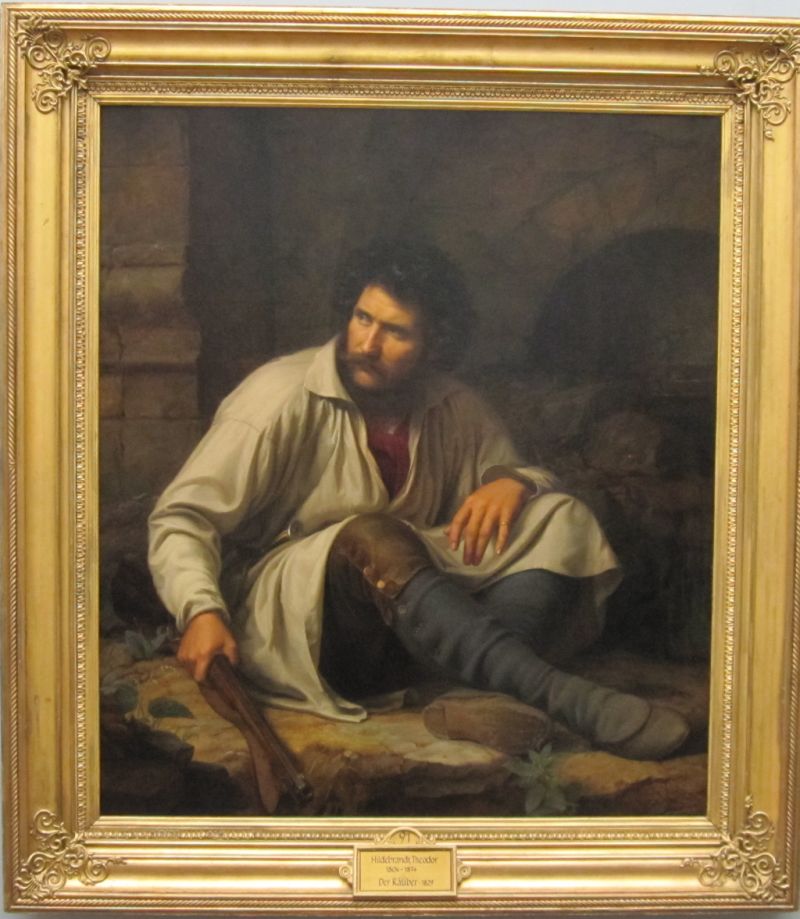At last, I’ve read Schiller’s “Die Räuber” – “The Robbers” – (1780). I wonder if Theodor Hildebrandt was thinking of Schiller’s play when he painted this painting, “The Robber,” in 1829.)
“Die Räuber” was Friedrich Schiller’s first tragedy (and how!), performed in Mannheim in the late 18th century. When “Die Räuber” was first performed “the effect was said to have been so great that members of the audience embraced one another out of happiness, emotion, enthusiasm, incapable of resisting their rapture.” (Jacob Mueller, in Memories of a Forty-Eighter, p. 40)
Mueller claims “Die Räuber” was the first serious theater performed by German Americans in Cleveland, Ohio. The performance took place in 1852. Mueller states (somewhat superciliously):
“The American artistic taste of that day had not advanced much beyond minstrels and bare-back riding … In the social and political arena, in the courts and even on the pulpit, one could see splendid examples of dramatic and comic art, in all the simplicity of the manners then. It might have been the fear of competition which led many to see professional theater as something sinful which should not be allowed to establish itself.
“It hardly needs to be mentioned that there is no German tradition hostile to the theater, but if such had existed, it would have been silenced by a work as popular as “Die Räuber,” since young and old knew the play, or at least some of its interesting characters. … Those amateurs who were to play the roles of the robbers, including the Capuchin and pastor Moser, were like all disciples of drama in suffering both shortage of money and a chronic excess of thirst. This cost [the director] Stieger all the more because thirst raised its head at every rehearsal, demanding to be drowned by spirited means. When thirst was ignored during rehearsals, to save money, it was no good. Even by the second act the tongues of the actors seemed to stick to their gums …”
I had read this review before reading the play, so as I toured the theater exhibit at the Heimatsmuseum in Bad Dürkheim, I asked the curator about “Die Räuber.”
“It’s a difficult play,” I said, “for an amateur company to put on, isn’t it?”
Dr. Preuss smiled. “It was very often performed, but many theater companies felt Schiller’s original was too long, so they staged an … abbreviated version.”
In this politically subversive oeuvre, one brother betrays another, and the betrayed leads a gang of robbers to attack lords of manors who are robbing their subjects. As the book jacket of my Penguin Classic sums it up, “The Robbers” is “concerned with freedom: with man’s attempt to spread his wings and fly, to be the arbiter of his own destiny, even to change the world in accordance with his own designs.”
One of my favorite lines from the play, spoken by Moor: “The law has cramped the flight of eagles to a snail’s pace. The law never yet made a great man, but freedom will breed a giant, a colossus.”
How did the Clevelanders end their play? By singing a chorus of a song of the robbers: “Ein Freies Leben Führen wir” (We Lead a Life of Liberty) – a rousing rendition in which the audience joined in.

